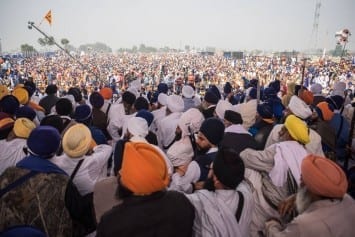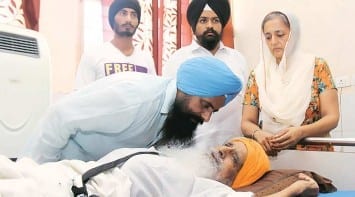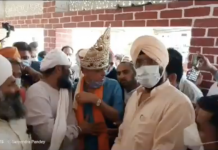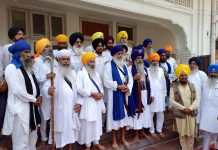


This past week, the Sikh community had its largest gathering in decades. Known as the Sarbat Khalsa, this conclave consisted of representatives of almost all Sikh groups from every region of the world. These disparate groups came together to choose new leadership, including the Supreme Political Leader of the Sikh religion, known as the Jathedar of Sri Akal Takht Sahib.
For the last few decades, the job of the Akal Takht Sahib Jathedar, has been occupied by priests employed and chosen through various means, but primarily by the Government of Punjab. Effectively, the government in India has controlled the socio-political affairs of the Sikh religion for almost thirty years.
The day after the Sarbat Khalsa conclave, all of the organizers of the event along with prominent speakers were rounded up by the Punjab Police and charged with sedition, or acts against the state.
This begs the question, how is the free exercise of religion an act against a democratic state?



For over 300 days, Bapu Surat Singh, an 83 year old Sikh man, has been on hunger strike to free political prisoners who have already served their mandatory sentences. Bapu Surat Singh’s campaign to seek justice for these prisoners has been entirely peaceful, yet, he has been detained six times already by the State. His son, Gogi, who also faces sedition charges for speaking at the Sarbat Khalsa, was previously detained for over a month and severely tortured while in custody. As a US Citizen, he was released after pressure was mounted through US Congressmen who signed a letter to Secretary of State John Kerry seeking Gogi’s release.
Despite the nearly ten month long hunger protest by Bapu Surat Singh, no prisoner has been released. Sikhs now have more political prisoners, including the senior leadership, for merely organizing the Sarbat Khalsa.
Freedom of Expression, Protest, and Religion Are Basic Fundamental Rights yet the “largest democracy in the world” continues to defy the basic rights of its citizens. India takes pride in following an electoral system to select its state officials; however, its democracy is far from being a perfect system. The Sarbat Khalsa organizers passed a resolution seeking independent, Vatican-like control of the Akal Takht Sahib, as it had existed before the 1980s. They deliberately avoided passing any direct statement on Khalistan, a free Sikh homeland. But despite such controls, the leaders are now charged with sedition. Even if Khalistan was the primary agenda of the Sarbat Khalsa, shouldn’t a true democratic country allow its citizens to peacefully highlight their demands?
In the recent past, we have seen how referendums were organized for an independent Scotland and Catalonia. On December 14, 1960, the United Nations general assembly adopted that, “All peoples have the right to self-determination; by virtue of that right they freely determine their political status and freely pursue their economic, social and cultural development.” Before its independence from the British, the founding fathers of India, including Jawaharlal Nehru, had promised the Sikhs the right to “self-determination” in independent Punjab. His own words affirmed that, “The brave Sikhs of Punjab are entitled to special consideration. I see nothing wrong in an area and a setup in the North, wherein the Sikhs can also experience the glow of freedom.”
However, just as the British rule came to an end in independent India, so did empty promises by the Indian leadership. Sikhs were always a sovereign people, given their distinct identity, scriptures, and religion. However, today, Sikhs are left with mere memories of their ‘Raaj’, as not just the Sikh homeland, but all Sikh religious, cultural, and educational institutions remain occupied by the state.
Sarbat Khalsa is the democratic gathering of Sikhs. Oppressing the institution of Sarbat Khalsa is akin to stripping the electoral rights of Indian citizens. Today, over a dozen Sikh leaders face sedition charges. Members of the North American Sikh delegation were also charged for committing the same “crime”, solely for participating in Sarbat Khalsa preparations. Such tactics were likely used to instill fear among the Punjabi and diaspora Sikhs – a warning of their own fate if they show an interest in politics. Dear Indians, this is fascism and totalitarianism, not democracy.





You have 3 forces in Punjab
1) State force : Made by people of Punjab and ruled by SAD
2) National Force : Made by people of India and Ruled by BJP
3) Empires Force : Made by people of World and ruled in India by Congress .
If our religion will calls for the Breaking up of the nation then all the forces will call it Sedition.
If a Religion teaches breaking up of the Country then it is
“SEDETION”
https://www.facebook.com/balbir.singh.355
India does not respect religious freedom of minorities. It is really a fascist Hindu state disguised as a “secular democracy”.